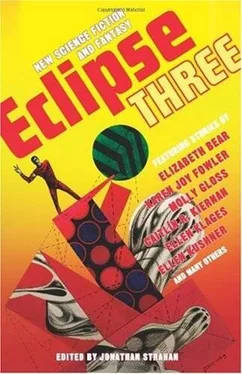A special will give me money for property tax. My cistern is getting low and there is no rain coming until the monsoon in June, which is a long way from now. If it's like last year, we won't get enough rain to fill the cistern anyway. I could pay for the water truck to make a delivery. But I don't like this. When I put the specials on my website, I thought about it as a way to make money. I had seen it on another doll site. I am a trained sculptor. I didn't think about why people would ask for specials.
Some people ask me to make infant dolls of their own children. If my mother had bought an infant version of me I'd have found it pretty disturbing.
One woman bought a special modeled on herself. She wrote me long emails about how her mother had been a narcissist, a monster, and how she was going to symbolically mother herself. Her husband was mayor of a city in California, which was how she could afford to have a replica of her infant self. Her emails made me uncomfortable, which I resented. So eventually I passed her on to another doll maker who made toddlers. I figured she could nurture herself up through all the stages of childhood.
Her reborn was very cute. More attractive than she was in the image she sent. She never commented. I don't know that she ever realized.
I suspect the Mazars fall into another category. I have gotten three requests from people who have lost an infant. I tell myself that there is possibly something healing in re-creating your dead child as a doll. Each time I have gotten one of these requests I have very seriously considered taking the specials off my website.
Property tax payments. Water in the cistern.
If the Mazars lost a child-and I don't know that they did but I have a feeling that I can't shake-it was bad enough that they want a replica. Then a year ago, I got a request for the second.
I thought that maybe Rachel-if it is Rachel who emails me, not Ellam-had meant to send a different image. I sent back an email asking were they sure that she had sent the right image?
The response was terse. They were sure.
I sent them an email saying if something had happened, I could do repairs.
The response was equally terse. They wanted me to make one.
I searched online, but could find out nothing about the Mazars of Chicago. They didn't have a presence online. Who had money but no presence online? Were they organized crime? Just very very private? Now a third doll.
I don't answer the email. Not yet.
Instead I take my laptop out to the shed. Inside the shed is my oven for baking the doll parts between coats of paint. I plug in the computer to recharge and park it on a shelf above eye level. I have my parts cast by Tony in Ohio, an old connection from my days in the toy industry. He makes my copper molds and rotocasts the parts. Usually, though, the specials are a one-off and he sends me the copper supermaster of the head so he doesn't have to store it. I rummage through my molds and find the head from the last time I made this doll. I set it on the shelf and look at it.
I rough sculpt the doll parts in clay, then do a plaster cast of the clay mold. Then from that I make a wax model, looking like some Victorian memorial of an infant that died of jaundice. I have my own recipe for the wax-commercial wax and paraffin and talc. I could tint it pink, most people do. I just like the way they look.
I do the fine sculpting and polishing on the wax model. I carefully pack and ship the model to Tony and he casts the copper mold. The process is nasty and toxic, not something I can do myself. For the regular dolls, he does a short run of a hundred or so parts in PVC, vinyl, and ships them to me. He keeps those molds in case I need more. For the head of a special he sends me back a single cast head and the mold.
All of the detail is on the inside of the mold, outside is only the rough outline of the shape. Infants' heads are long from forehead to back of the skull. Their faces are tiny and low, their jaws like porkchop bones. They are marvelous and strange mechanisms.
At about seven, I hear Sherie's truck. The dogs erupt.
Sherie and Ed live about a mile and a half up the road. They have a little dairy goat operation. Sherie is six months pregnant and goes into Albuquerque to see an obstetrician. Her dad works at Sandia Labs and makes decent money so her parents are paying for her medical care. It's a long drive in and back, the truck is old and Ed doesn't like her to go alone. I ride along and we pick up supplies. Her mom makes us lunch.
"Goddamn it's hot," Sherie says as I climb into the little yellow Toyota truck. "How's your water?"
"Getting low," I say. Sherie and Ed have a well.
"I'm worried we might go dry this year," Sherie says. "They keep whining about the aquifer. If we have to buy water I don't know what we'll do."
Sherie is physically Chinese, one of the thousands of girls adopted out of China in the nineties and at the turn of the century. She said she went through a phase of trying to learn all things Chinese, but she complains that, as far as she can tell, the only thing Chinese about her is that she's lactose intolerant.
"I had a migrant at my door this morning," I say.
"Did you feed him?" she asks. She leans into the shift, trying to find the gear, urging the truck into first.
"He weeded my garden," I say.
"They're not going to stop as long as you feed them."
"Like stray cats," I say.
Albuquerque has never been a pretty town. When I came it was mostly strip malls and big box stores and suburbs. Ten years of averages of four inches of rain or less have hurt it badly, especially with the loss of the San Juan/Chama water rights. Water is expensive in Albuquerque. Too expensive for Intel, which pulled out. Intel was just a larger blow in a series of blows.
The suburbs are full of walkaway houses-places where homeowners couldn't meet the mortgage payments and just left, the lots now full of trash and windows gone. People who could went north for water. People who couldn't did what people always do when an economy goes soft and rotten, they slid, to rented houses, rented apartments, living in their cars, living with their family, living on the street.
But inside Sherie's parents' home it's still twenty years ago. The countertops are granite. The big screen plasma TV gets hundreds of channels. The freezer is full of meat and frozen Lean Cuisine. The air conditioner keeps the temperature at a heavenly 75 degrees. Sherie's mother, Brenda, is slim, with beautifully styled graying hair. She's a psychologist with a small practice.
Brenda has one of my dolls, which she bought because she likes me. It's always out when I come, but it doesn't fit Brenda's tailored, airily comfortable style. I have never heard Brenda say a thing against Ed. But I can only assume that she and Kyle wish Sherie had married someone who worked at Los Alamos or at Sandia or the university, someone with government benefits like health insurance. On the other hand, Sherie was a wild child, who, as Brenda said, "Did a stint as a lesbian," as if being a lesbian were like signing up for the Peace Corps. You can't make your child fall in love with the right kind of person. I wish I could have fallen in love with someone from Los Alamos. More than that, I wish I had been able to get a job at Los Alamos or the university. Me, and half of Albuquerque.
Sherie comes home, her hair rough-cut in her kitchen with a mirror. She is loud and comfortable. Her belly is just a gentle insistent curve under her blue Rumatel goat dewormer t-shirt. Brenda hangs on her every word, knows about the trials and tribulations of raising goats, asks about Ed, the truck. She feeds us lunch.
I thought this life of thoughtful liberalism was my birthright, too. Before I understood that my generation was to be born in interesting times.
Читать дальше











